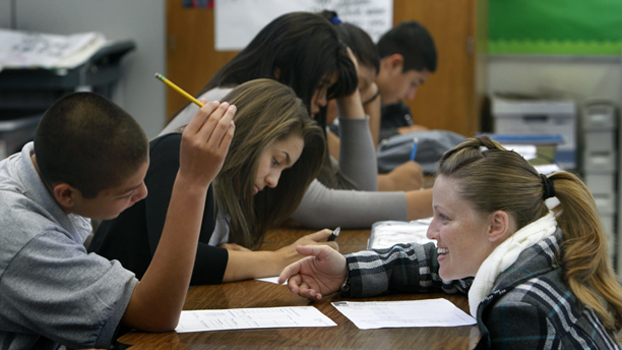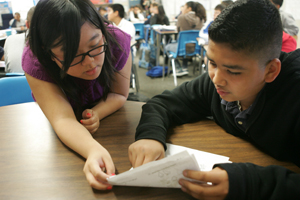 Caption: Kristen Littlefield, right, helps Waite Middle School students with math as part of the Math Ambassadors program. Photo: Karen Tapia Download Photo
Caption: Kristen Littlefield, right, helps Waite Middle School students with math as part of the Math Ambassadors program. Photo: Karen Tapia Download Photo
Math Ambassadors
Helping Middle School Students Achieve in Mathematics
On a recent spring morning inside an eighth-grade math classroom at Norwalk’s Waite Middle School, Cal State Fullerton senior Kristen Littlefield strolled from desk to desk, glancing at students’ work as they took an algebra quiz.
Littlefield checked students’ papers, pointed out possible mistakes, then gave them nods of encouragement.
In another classroom, Tracy Chou, a child and adolescent development major, sat at a small table at the back of the room, closely working with two sixth-graders needing extra one-to-one support in learning math lessons. Meanwhile, their math teacher was proceeding with the day's lesson for the rest of the class.
Since last fall, Littlefield and Chou have been serving as Cal State Fullerton’s “math ambassadors,” spending 10 hours a week in Waite’s math classrooms to provide individualized, extra instruction. Launched last fall, as many as 17 undergraduates have participated in the program, offered by the College of Education’s Department of Secondary Education.
“Seeing the light bulb go off in students’ heads and having them finally understand the math concepts they were struggling with has been the most rewarding,” said Littlefield, who plans to pursue a credential to teach middle school math after she earns a bachelor’s degree in child and adolescent development this May.
The math ambassadors’ efforts so far have paid off, said Mark Ellis, chair and associate professor of secondary education.
“Based on school district benchmark exams given in October and January, student achievement in math has dramatically increased,” Ellis pointed out. “There's been a positive impact on student learning to date with increases of up to 70 percent in the number of students demonstrating proficiency. In particular, for the school’s lowest-performing math students, their competency levels have increased significantly.”
School officials also are pleased with the math program’s results and the improved academic achievement of students, said Willie Norman, Waite’s principal.
Beyond strengthening math skills, Norman noted that the Math Ambassadors program also has helped to build students’ confidence in their mathematical abilities.
“The math ambassadors have brought in a fresh approach, and we’re appreciative of their knowledge and ability to connect with the children,” Norman said.
Ellis is among education and mathematics faculty members involved in the program, coordinated by Sandra Alaux, lecturer in secondary education and adviser for the foundational-level math credential program. As part of the math ambassadors’ training, Alaux holds monthly seminars on math strategies to teach key math concepts that often pose a challenge for the middle school students.
The Math Ambassadors program is made possible by a $25,000 grant from the California State University Chancellor’s Office, Math and Science Teaching Initiative. The Norwalk-La Mirada Unified School District also provided funding so that math ambassadors could continue their work with Waite’s students during the university’s five-week winter break.
The majority of funding goes toward stipends for the math ambassadors, who are majoring in different disciplines, yet have strong math skills and are considering teaching careers. Faculty members and school and district officials are currently seeking funding sources to continue the program for the next academic year at Waite. With additional funding, the program could be expanded to other school sites in the district, Ellis said.
Inspiring Future Teachers
The Math Ambassadors program has not only been beneficial for Waite’s students, but also provides classroom teaching experience for those who may become math teachers, Alaux said.
“This program gives these students the opportunity to work with experienced teachers and gain invaluable insights about teaching young children — before enrolling in a teacher credential program,” Alaux explained. “It’s a good way to get their feet wet, and to give them confidence to embrace a career teaching mathematics."
Like Littlefield, math ambassador Brittney Poff, also a child and adolescent development major who is on track to graduate in May, is strongly considering teaching math after being involved in the program.
“I knew I wanted to become a teacher, but I wasn’t sure if I wanted to become a math teacher or an elementary school teacher,” said Poff. “Because this experience has given me the opportunity to work with older students, I found that I love teaching in this environment. I feel that I would be better suited teaching in a middle school or a high school. This program helped put into concrete what I want to do for a career.”
Promoting Math Success
Waite Middle School was selected for the program because it serves a high-need population — with 70 percent English learners — and has teachers and administrators dedicated to finding ways to support student success and raise student achievement, Ellis said.
Since many Waite students have difficulties in math, the school was in need of extra resources to further support students’ understanding and growth in the subject, added Jenny Kim, who teaches seventh-grade math and is the program’s site coordinator.
“Students had the motivation and capabilities to learn, however, some had conceptual and skill deficits in certain areas,” said Kim. “By having the math ambassadors provide more individualized support, these students were able to close those gaps and achieve academic success. It has provided an environment conducive to conjecturing and thinking, which leads to a deeper level of comprehension in mathematics.”
The math ambassadors support extra instruction in sixth-grade math, prealgebra and algebra I through small group instruction within the classroom, supplemental instruction during an after-school math center, and Saturday morning “math academies” for parents who get help in understanding math concepts so they can better help their children at home.
“Through the math academies, we have built relationships with our parents and increased parental involvement,” said Kim, who is planning to pursue an administrative teaching credential and a doctorate in education. She is also a Robert Noyce master teaching fellow in the Fullerton Mathematics Teacher and Master Teacher Fellows Program.
Cal State Fullerton student Shannon Muramoto, who is earning her mathematics credential, is also a Noyce Fellow in the program and this semester is student teaching in Kim’s math class.
This project, funded through a $2.5 million National Science Foundation grant to recruit and prepare mathematics teachers, is led by Ellis; Martin V. Bonsangue, professor of mathematics, who is the university’s 2010-11 Outstanding Professor; and Ruth Yopp-Edwards, professor of elementary and bilingual education. All are also involved in the Math Ambassadors program to analyze data and provide oversight.
April 6, 2012

